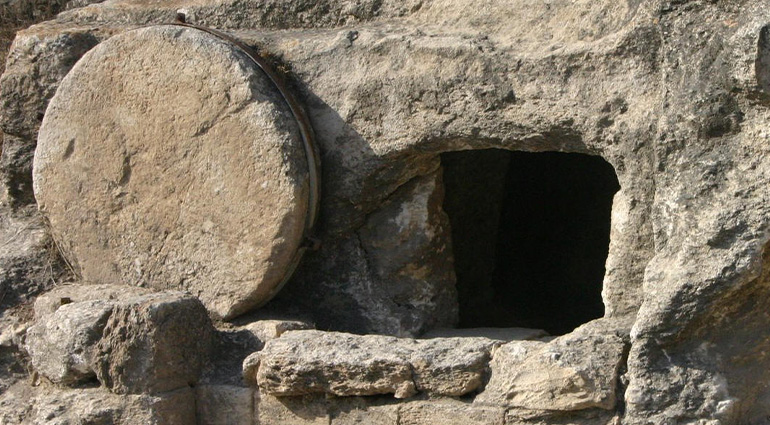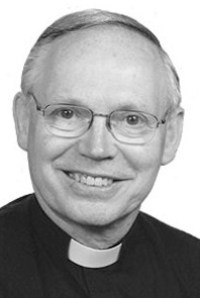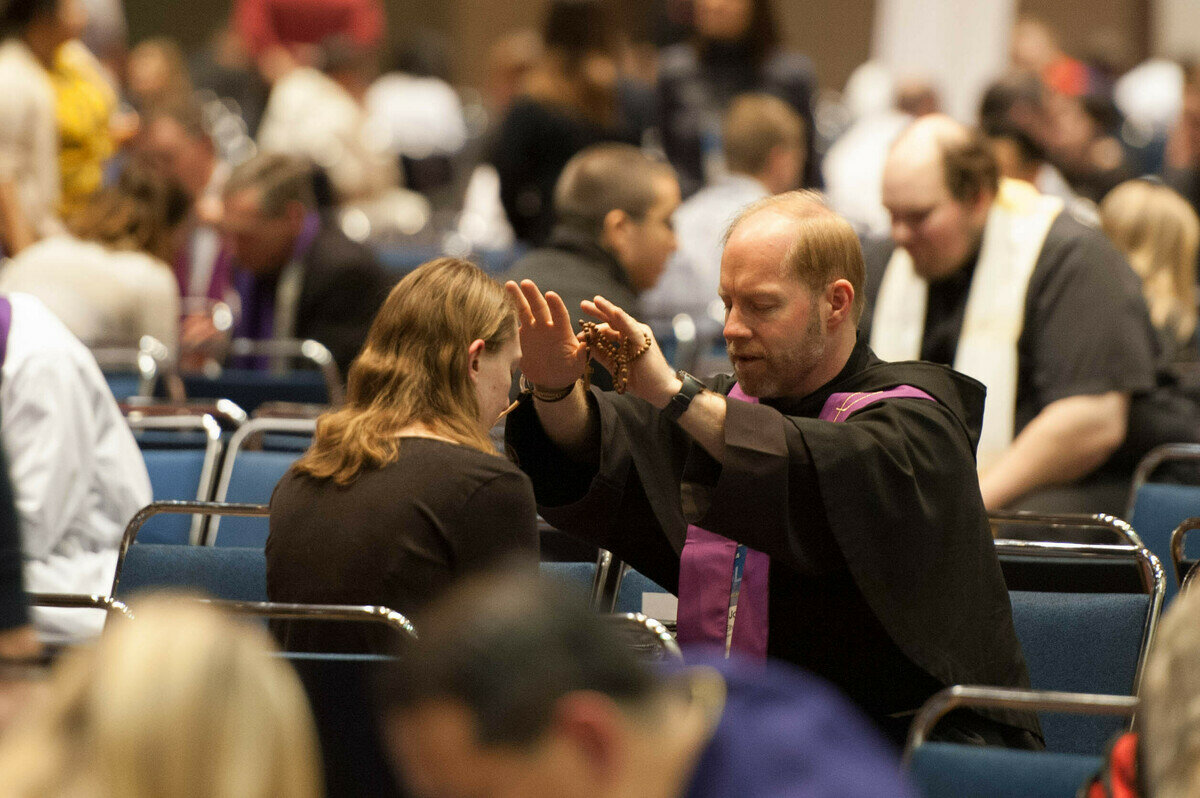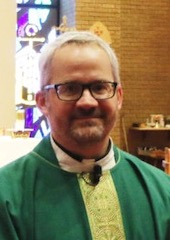5th Sunday of Lent – Year A
Top-Rate Preachers
Stench!
5th Sunday of Lent (A)
In those old paintings of the raising of Lazarus,
artists often depicted bystanders literally holding their noses,
or covering their mouths with hands or veils
as if nauseous and about to be sick.
The evangelist and artists want to make sure
we know that Lazarus is truly dead:
that what Jesus is doing here
is not simply waking someone from a deep sleep or a coma.
No.
Jesus is messing with death.
And it smells bad.
Topic suggestions for incorporating into homilies, or creating requests for intercessory prayers.
Addiction and Recovery | Catholic Apologetics | Church History | Conflict and Violence | Diversity and Inclusion | Family and Children | Moral Theology | Respect for Life | Theology of the Body | Theology of Work | Vocations
Topic suggestions for incorporating into homilies, or creating requests for intercessory prayers.
Addiction and Recovery | Catholic Apologetics | Church History | Conflict and Violence | Diversity and Inclusion | Family and Children | Moral Theology | Respect for Life | Theology of the Body | Theology of Work | Vocations
The Need to Surrender
5th Sunday of Lent (A)
I do not believe there is a more difficult or challenging passage in the Scriptures than this assertion by Jesus: that today, now, we have access to life, to joy, and to peace in his presence. We are all so much like Martha: we postpone life to some future time, to a time when we have met the conditions that we think are necessary in order to have life. We imagine that life will happen once we have attained a certain success or once we have corrected what is wrong in our life. Then, in that future, we suppose we will have life. Like Martha we say to ourselves, “Life will happen once I graduate from college, once I get married, once I stop smoking, once I retire, once I lose twenty pounds, once I make enough money, once I have the right kind of friends, once I get over this cold, once spring comes.” Whatever conditions we imagine, those conditions move life away from us. Jesus insists that we are mistaken. Life in its deepest sense does not result from anything we do or fail to do. Life happens when we surrender, when we surrender to Christ and God’s love for us which is available to us in this moment.
RELATED HOMILIES:
A Hope Which Never Dies
Life in the Presence of Death
Lazarus as a Disciple
If Only
Topic suggestions for incorporating into homilies, or creating requests for intercessory prayers.
Addiction and Recovery | Catholic Apologetics | Church History | Conflict and Violence | Diversity and Inclusion | Family and Children | Moral Theology | Respect for Life | Theology of the Body | Theology of Work | Vocations
Topic suggestions for incorporating into homilies, or creating requests for intercessory prayers.
Addiction and Recovery | Catholic Apologetics | Church History | Conflict and Violence | Diversity and Inclusion | Family and Children | Moral Theology | Respect for Life | Theology of the Body | Theology of Work | Vocations
Topic suggestions for incorporating into homilies, or creating requests for intercessory prayers.
Addiction and Recovery | Catholic Apologetics | Church History | Conflict and Violence | Diversity and Inclusion | Family and Children | Moral Theology | Respect for Life | Theology of the Body | Theology of Work | Vocations
Called Out of the Tomb
5th Sunday of Lent (A)
Some people are in tombs of their own making. They have experimented with substance abuse and become dependent on drugs, or they have given in to porn to such an extent that they are thoroughly addicted, seeing their lives dissolve around them. They may feel that there is no hope. But if they listen, they can hear the voice of the Lord, calling them, saying, “Come out of that tomb.” And with the Lord they can walk once more into the light.
Another tomb that many people find themselves in is the tomb they construct with their anger. One of my favorite cartoon strips, A Rose Is A Rose, presented this brilliantly. In the first panel we come upon Rose, chained to the wall in a prison cell. She is all bent over. She is frowning. In the second panel, she stands up and starts unlocking her chains. In the third panel she is in her living room, where her husband, Jimbo, is sitting on a couch watching TV. Rose says to him, “I’ve decided to forgive you.” In the last panel, she is dancing in a flower bed. So many people, so many of us, are in tombs along with Rose in the first panel. We are angry because someone has done us dirty. We hold grudges. You know what a grudge is, right? A grudge is poison we take hoping that another person will die. One lady told me, “I don’t care what you say, Father, I’m taking this to the grave.” To which I can only say, “Well, that’ll fix him.” Look, Jesus calls us out of the tomb of anger. He does this by calling us to forgive. He told us to pray, “Forgive us our trespasses as we forgive those who trespass against us.”
Topic suggestions for incorporating into homilies, or creating requests for intercessory prayers.
Addiction and Recovery | Catholic Apologetics | Church History | Conflict and Violence | Diversity and Inclusion | Family and Children | Moral Theology | Respect for Life | Theology of the Body | Theology of Work | Vocations
Jesus’ Almost Unbelievable Offer
5th Sunday of Lent (A)
Last Sunday’s readings were about light; this Sunday’s are about life.
“I am going to open your graves, and bring you up from your graves, O my people.” “If Christ is in you, though the body is dead because of sin, the Spirit is life because of righteousness.” “I am the resurrection and the life.”
“Those who believe in me, even though they die, will live,” Jesus says, “and everyone who lives and believes in me will never die.”
Topic suggestions for incorporating into homilies, or creating requests for intercessory prayers.
Addiction and Recovery | Catholic Apologetics | Church History | Conflict and Violence | Diversity and Inclusion | Family and Children | Moral Theology | Respect for Life | Theology of the Body | Theology of Work | Vocations
Those who are in the Flesh; Those who are in the Spirit
5th Sunday of Lent (A)
In the second reading St. Paul makes the distinction between those who are in the flesh and those who are in the Spirit. By this he is not speaking of those who are alive in the body as opposed to those who are in Purgatory or in Heaven. Rather, the distinction is between those whose focus is on the things of the flesh (worldliness, materialism, sensuality, etc.) and are, thereby, giving themselves over to occasions of sin as contrasted with those who are striving to live a deeper spiritual life and have sought to remove sin from their lives.
St. Paul says that if Christ is in us, meaning if we are in the state of grace, then the body is dead because of sin while the spirit is alive because of righteousness. Elsewhere St. Paul talks about putting to death the desires of the flesh, so when he speaks of the body being dead, he is talking about the fact that we put to death our sinful desires. This has been a struggle for human beings from the beginning, but with the internet and social media, it has become a far more difficult problem for many people in our day.
Topic suggestions for incorporating into homilies, or creating requests for intercessory prayers.
Addiction and Recovery | Catholic Apologetics | Church History | Conflict and Violence | Diversity and Inclusion | Family and Children | Moral Theology | Respect for Life | Theology of the Body | Theology of Work | Vocations
Death is a Doorway to Eternal Life
5th Sunday of Lent (A)
There are few things in life more permanent and guaranteed than death. Some would add taxes, but I think Malaysians can tell you that tax evasion is far easier than postponing and avoiding death. Despite the certainty of death, that doesn’t stop us from imagining what life would be like if death was only temporary, if one could actually rise from the dead. The Covid-19 pandemic, which has brought the whole world to its knees, brought global economies to a halt, caused nation-wide lockdowns in countries ranging from first world superpowers to third world nations, got me thinking about the scenario painted by post-apocalyptic zombie movies: reanimated human corpses roaming the world seeking to devour living flesh, a scenario that could one day actually become a reality. It was a frightening thought indeed.
Topic suggestions for incorporating into homilies, or creating requests for intercessory prayers.
Addiction and Recovery | Catholic Apologetics | Church History | Conflict and Violence | Diversity and Inclusion | Family and Children | Moral Theology | Respect for Life | Theology of the Body | Theology of Work | Vocations
Clergy E-Notes
5th Sunday of Lent (A)
Pro-life reflections and intercessions related to the Sunday readings
Topic suggestions for incorporating into homilies, or creating requests for intercessory prayers.
Addiction and Recovery | Catholic Apologetics | Church History | Conflict and Violence | Diversity and Inclusion | Family and Children | Moral Theology | Respect for Life | Theology of the Body | Theology of Work | Vocations
Do You Believe Even When God Delays?
5th Sunday of Lent (A)
 SINGLE HUMANITY
SINGLE HUMANITY Don’t be afraid to take a position in the story. Where do I place myself in the scene?
Do I see myself as Lazarus –bound in the cloths of the dead, head to the feet? Do I feel like someone locked up in a cave, whose entrance is blocked with a big stone? Do I feel like other people have given up on me? In the Gospel of this Sunday Jesus is shouting out to you «Come out!”
Or, perhaps do I feel myself like Martha and Mary? I mourn different forms of loss: in my personal life, in my family or in my work? And because of these situations, do I remain sour, disappointed and always in finger-wagging? As a result, I impute God and others for the miseries of my life because they never arrived in time to rescue me. In such state, what good news does this Sunday’s gospel offer me?
Jesus is saying to me, like he did to Martha: “I am the resurrection and the life… Do you believe this?” That’s a key question Jesus poses to me. And how do I keep my faith in life in the face of the infamous virus that somewhat sets the world upside down?
Topic suggestions for incorporating into homilies, or creating requests for intercessory prayers.
Addiction and Recovery | Catholic Apologetics | Church History | Conflict and Violence | Diversity and Inclusion | Family and Children | Moral Theology | Respect for Life | Theology of the Body | Theology of Work | Vocations
Death Where is Your Sting?
5th Sunday of Lent (A)
Death is the end of life’s plans and aspirations. When Jesus says, “I am the resurrection and the life,” our pains, trials and even death have more meaning. Jesus is telling us to centre our life on Him, for when we do, we begin to die to our selfishness and live for others. When we do, Jesus will be glorified in us. Like Martha in John 11, we must say, “Yes, Lord, I believe.” Do we believe in Jesus’ words in Jn 11:25, 26: “I am the resurrection and the life, says the Lord; whoever believes in me will never die”
Topic suggestions for incorporating into homilies, or creating requests for intercessory prayers.
Addiction and Recovery | Catholic Apologetics | Church History | Conflict and Violence | Diversity and Inclusion | Family and Children | Moral Theology | Respect for Life | Theology of the Body | Theology of Work | Vocations
The Third Scrutiny
5th Sunday of Lent (A)
Today Jesus confronts a terrible reality – death, the death of a friend named Lazarus.
Before considering how Jesus addresses death, I’d like to say a word about how ancient people viewed death. The Greeks saw us as having a place between the gods and the animals. Unlike the gods who are immortal, we must die. The animals die as we do, but they seem unaware of their coming death. We humans, however, live with an awareness of death – our own and those we love.
The prophet Isaiah says death is “the veil that veils all peoples, the web that is woven over all nations.” (25:7)
Do we fear death? I don’t sense that most people do. I think C.S. Lewis got it right. He used this quote: “I am not so much afraid of death as ashamed of it.”* We feel a repugnance for death. We can see that shame or repugnance in our response to the coronavirus. The people of our country and most nations are making extraordinary sacrifices to prevent the death of others – mainly old people like myself.**
The repugnance for death has caused people to adopt an “abundance of caution”. Otherwise, we are told, a person could be responsible for someone else’s sickness and death.
Topic suggestions for incorporating into homilies, or creating requests for intercessory prayers.
Addiction and Recovery | Catholic Apologetics | Church History | Conflict and Violence | Diversity and Inclusion | Family and Children | Moral Theology | Respect for Life | Theology of the Body | Theology of Work | Vocations
Come Out of Your Tomb, Be Unbound and Set Free
5th Sunday of Lent (A)
Jesus called Lazarus out of the tomb but Jesus himself did not unbind him, others unbound Lazarus. When you meet Jesus in prayer he calls you out of your tomb, and your spiritual director unbinds you. You must begin the process of sending a message to Jesus like Martha and Mary by spending time in prayer and inviting the Lord into every aspect of your life and then answering his call to come out of the tomb. Your spiritual director will not be able to unbind you if you do not firstly accept Jesus’ invitation to come out of the tomb. Then, with the grace of Jesus, your spiritual director unbinds you and sets you free. But your spiritual director can do nothing if you do not firstly send the message to Jesus and answer his invitation.
Topic suggestions for incorporating into homilies, or creating requests for intercessory prayers.
Addiction and Recovery | Catholic Apologetics | Church History | Conflict and Violence | Diversity and Inclusion | Family and Children | Moral Theology | Respect for Life | Theology of the Body | Theology of Work | Vocations
“Father, I Thank You for Hearing Me”
5th Sunday of Lent (A)
There is almost an ordinariness to the way our Lord goes about his mission of proclaiming and living God’s Kingdom. Even his miracles and the raising of his friend Lazarus are not exceptions. Our Lord takes his time in getting to the scene of Lazarus’ illness and death. He takes time in speaking with both Martha and Mary. Arriving at the tomb he asks that the stone be rolled back. He addresses the Father and then, with a loud voice, cries, “Lazarus, come out!” The once-dead man walks out.
There are no flashes of light or rolling thunder. Our Lord does not need to make strange incantations or weave any sort of spell. He does not even seem to have to fast in preparation for such an extraordinary thing. There is no burning of incense or sacrifices offered. Jesus simply gives honor to the Father, calls Lazarus forth and his friend is restored to life.
Topic suggestions for incorporating into homilies, or creating requests for intercessory prayers.
Addiction and Recovery | Catholic Apologetics | Church History | Conflict and Violence | Diversity and Inclusion | Family and Children | Moral Theology | Respect for Life | Theology of the Body | Theology of Work | Vocations
Into the Depth of Human Need
5th Sunday of Lent (A)
One who is truly ‘Catholic’ cannot be content to find personal security within a praying and worshipping community. We are grateful when grace frees us from the tombs where our soul has lain buried. We are grateful when our community, too, is called forth into a richer and freer life. However, we cannot forget the tombs that bury so many beautiful people in the community and in the world around us. We cannot belong to Jesus without weeping with him and without calling people to leave their tombs and come into the light to enjoy God’s embrace. The greatly loved Pope John XXIII died on 3rd June 1963. On May 31st, just prior to receiving the last anointing, he shared these thoughts with those who stood around his bed: ‘The secret of my ministry is in that crucifix you see opposite my bed. It is there so that I can see it in my first waking moment and before going to sleep. It is there, also, so that I can talk to him during the long hours of the night. Look at it. See it as I see it. Those open arms have been the program of my pontificate. They say that Christ died for all, for all. No one is excluded from his love, from his forgiveness. What did Christ leave to his Church? He left us his prayer ‘that all may be one’(John 10:16). … In this last hour I feel calm and sure that my Lord, in his mercy, will not reject me. Unworthy though I am, I wanted to serve him, and I have done my best to pay homage to truth, justice, charity, and the meek and humble heart of the Gospel. My time on earth is drawing to a close. But Christ lives on and the Church continues his work. Souls, souls. That all may be one!’
Topic suggestions for incorporating into homilies, or creating requests for intercessory prayers.
Addiction and Recovery | Catholic Apologetics | Church History | Conflict and Violence | Diversity and Inclusion | Family and Children | Moral Theology | Respect for Life | Theology of the Body | Theology of Work | Vocations
Release from the Tombs
5th Sunday of Lent (A)
I wonder how it was when Lazarus died for the second time. Were Mary and Martha there? Most likely Jesus was not; for he, shortly after he raised Lazarus, died the death himself and, despite the Resurrection, left the sisters to grieve once again.
Of what did Lazarus eventually die? Was it a recurrence of the original affliction or something unforeseen? Did Mary and Martha, the second time around, think that Jesus could spare Lazarus anew? Martha, remember, had told Jesus, “If you had been here, my brother would not have died.” Perhaps she would be bold enough to wonder out loud what the point of the earlier miracle was if Lazarus was going to die anyway.
Topic suggestions for incorporating into homilies, or creating requests for intercessory prayers.
Addiction and Recovery | Catholic Apologetics | Church History | Conflict and Violence | Diversity and Inclusion | Family and Children | Moral Theology | Respect for Life | Theology of the Body | Theology of Work | Vocations
Lazarus
5th Sunday of Lent (A)
St. Augustine remarks that the spiritual death described by Lazarus’ death is the sin that has not only affected the inner soul. Indeed, this spiritual death has not only affected the outer soul. The spiritual death of Lazarus represents the sinfulness that makes our lives stink to other people around us, it has affected our relationships, and has killed
the person God intended us to be.
Look at Jesus when he learns the fate of his friend Lazarus. It says Jesus wept. Now this is God. God is weeping for Lazarus. Furthermore, it says Jesus groaned. God is groaning because God hates death. Like St. Irenaues, Gloria Dei vivans homo, the glory of God is a human being fully alive. And so, Jesus commands us to roll away the stone.
Topic suggestions for incorporating into homilies, or creating requests for intercessory prayers.
Addiction and Recovery | Catholic Apologetics | Church History | Conflict and Violence | Diversity and Inclusion | Family and Children | Moral Theology | Respect for Life | Theology of the Body | Theology of Work | Vocations


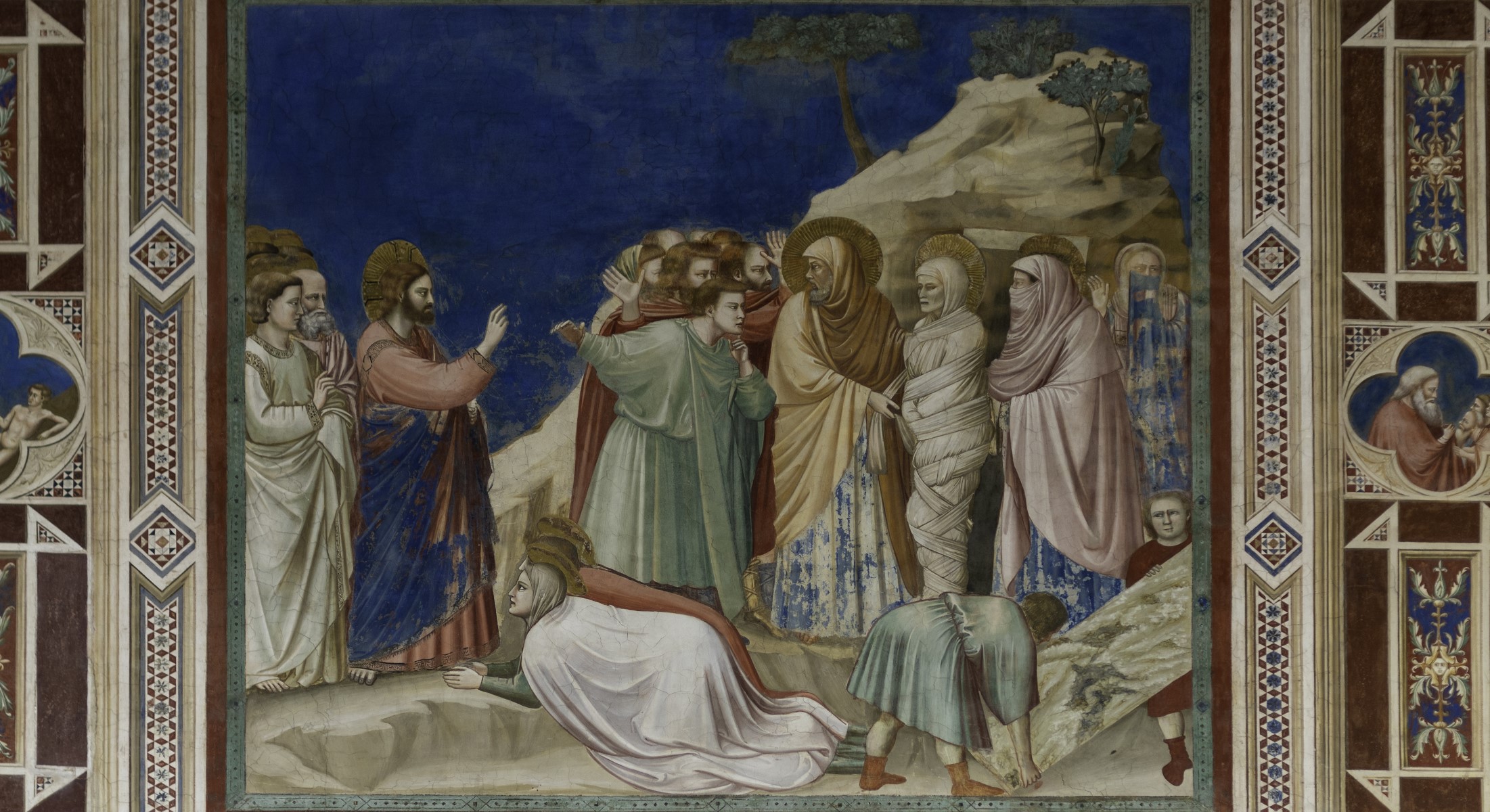
 The Dominican Friars in Britain
The Dominican Friars in Britain 







